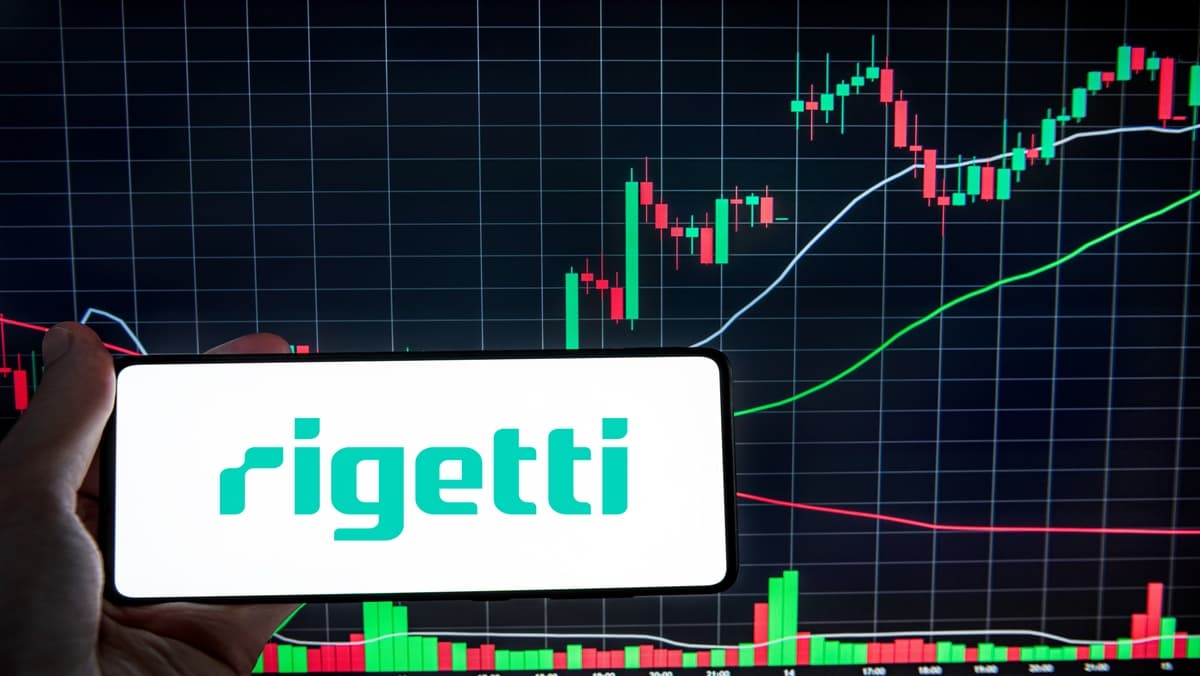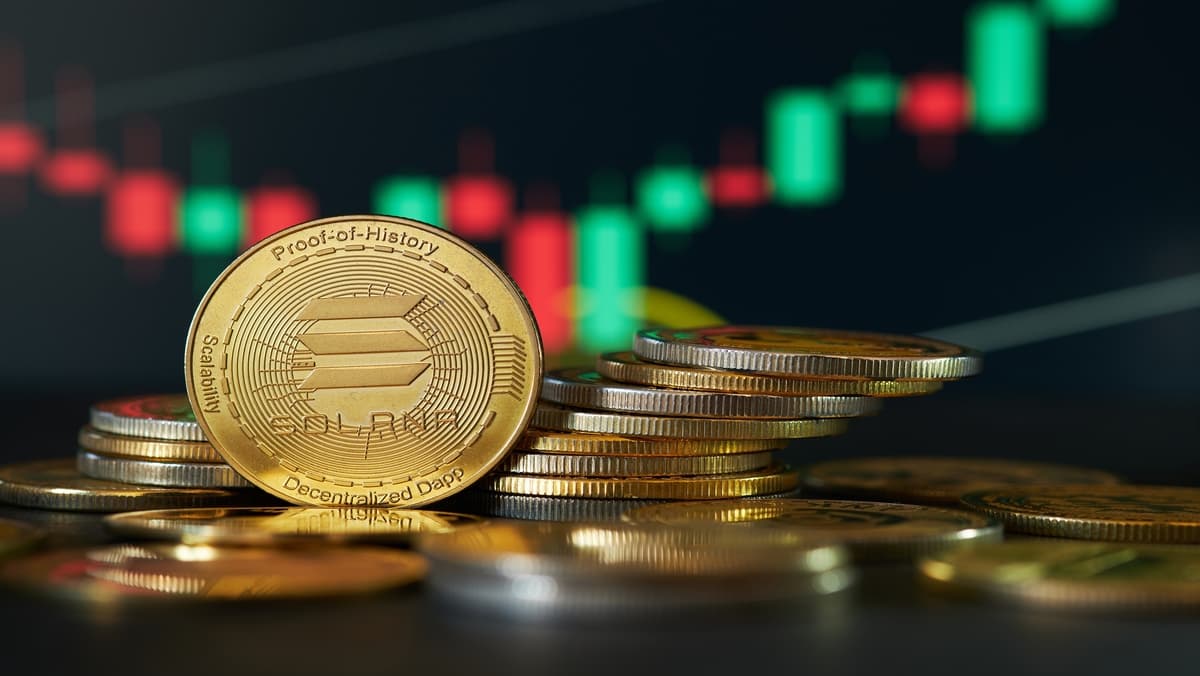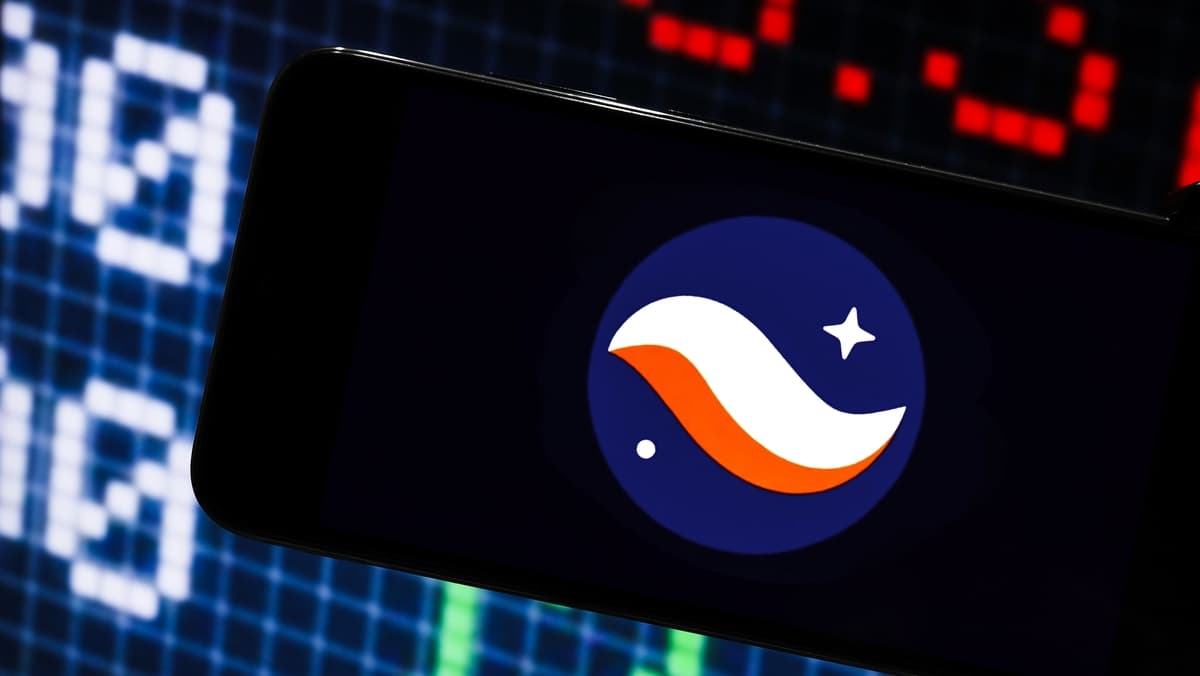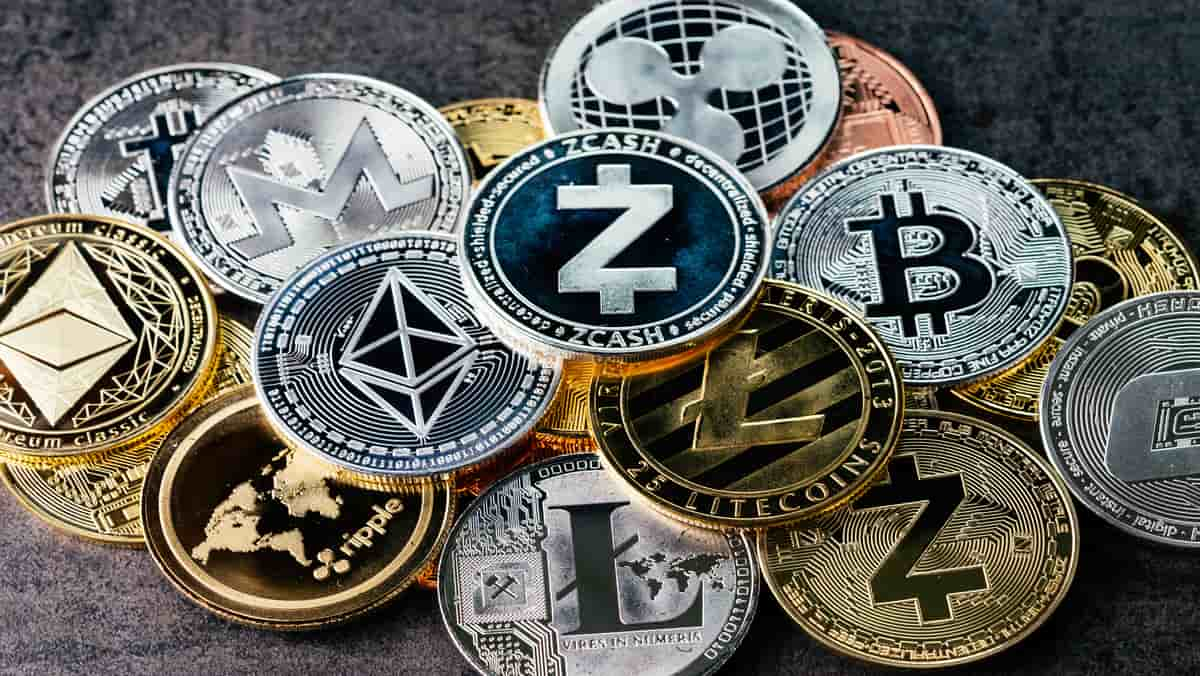Factors
Company Performance: EG4.F's financial health, revenue growth, and profitability greatly influence its stock price.
Market Sentiment: Overall investor mood and market trends impact EG4.F, irrespective of its fundamentals.
Industry Trends: Developments and growth prospects in EG4.F's sector affect investor confidence.
Economic Conditions: Macroeconomic factors like inflation, interest rates, and GDP growth influence investor decisions.
Competitor Activities: Actions and performance of EG4.F's rivals affect its market position and stock value.
News and Events: Company-specific news (e.g., product launches, partnerships) can cause price fluctuations.
Global Events: Geopolitical events and international trade dynamics can introduce volatility.
Regulatory Changes: New regulations impacting EG4.F's industry can affect its profitability.
Investor Confidence: Belief in the company's management and future prospects drives investment.
Supply and Demand: The balance of buyers and sellers directly affects the stock's trading price.
Technological Advancements: Innovations that impact EG4.F's operations or market can influence its stock.
Commodity Prices: Changes in prices of raw materials or other commodities impact production costs.
Exchange Rates: Currency fluctuations impact EG4.F earnings if its operations cross borders.
Analyst Ratings: Reports and ratings from financial analysts influence investor perception and trading decisions.
Dividend Policy: Dividend payouts may draw investors, affecting stock price.
Mergers and Acquisitions: Potential or actual mergers/acquisitions can drive stock price changes.
Management Changes: Changes in key leadership positions can impact investor confidence.
Social Trends: Shifting social preferences and demands impact EG4.F business.
Cybersecurity: Cybersecurity incidents impact investors trust and, in turn, the stock price.
ESG Factors: Investors increasingly evaluate sustainability which influences stock.
Share Buybacks: When a company buys back shares to increase the stock value.
Political Stability: Political events and elections will impact investors confidence.
Labor Disputes: Labor disputes and union action will impact the stock price.
Natural Disasters: Natural disasters will disrupt supply chains to impact stock.
Energy prices: Energy prices can impact production costs affecting the company stock.
Supply Chain Disruptions: Supply chain disruptions can impact stock prices due to supply issues.
Healthcare factors: Healthcare cost and access can impact employee cost.
Technological Disruption: The introduction of disruptive technology can impact a company stock.
Changes in consumer preferences: Changes in consumer preference will impact a company stock.
Consumer confidence: Consumer confidence can impact the market and in turn stock prices.
Inflation: Affects costs, interest rates, and consumer behavior, thus stock prices.
Interest Rates: Impact the cost of borrowing which affect investor investment.
Unemployment Rates: Impact consumer spending and market sentiment and prices.
Government policies: Government policies impact industries which affect stock prices.
Geopolitical events: Political instability and conflicts influence investor confidence and stock prices.
Trade restrictions: International trade dynamics affect the company value and thus the stock.
Legal Challenges: Affects stock prices by creating uncertainty about business.
Reputation: The company reputation, whether good or bad, affects stock prices.
Financial Scandals: Undermine investor trust, negatively impacting prices.
Pandemics: Cause volatility and impact businesses globally which impact the stock.
Environmental Issues: Pollution affects stock prices, reflecting concerns and potential liabilities.
Technological Adoption: Adoption can drive stock prices up when innovative and beneficial.
Intellectual Property: Patents will affect the stock price.
Seasonality: Can impact revenue streams depending on the products sold.
Regulatory uncertainty: Can affect the profitability and stock price.
Changes in tax laws: The changes can affect investor investment and prices.
Global economy: Global economic growth or recession greatly affects stock values.
Demand: Changes in demand can affect stock prices depending on business sector.
Brand: Changes in brand can affect stock prices.
Media Coverage: Affects stock prices when the media covers the company.
Investor relations: The company’s effort in communicating with investors affects stock prices.
Risk management: How a company manages risks affects its stock price.
Operational efficiency: Efficiency impacts profitability, influencing stock prices.
Innovation: New ideas affects investor confidence.
Customer loyalty: Loyalty can affect stock prices as a result of confidence.
Debt levels: High debt levels can worry investors.
Corporate Governance: Impacts investor trust.
Competition: Affects stock prices due to competitive pressure.
Market capitalization: Stock prices can have volatility depending on the size.
Liquidity: Liquidity ensures easy buying and selling, influencing stability.
Volatility: Volatility of stock prices can impact investment decision.
Volume: High volume of trade impacts investment decision and trust.
Beta: Measures the risk of an investment.
Share dilution: Affects value per share.
Reverse stock splits: Can be viewed negatively due to past struggles.
Stock splits: Making stock more affordable.
Short interest: Affects stock price due to sentiment.
Inflation expectations: Can impact market and in turn the stock prices.
Insider trading: Trading based on insider information can affect the company.
Dark pools: Can cause unpredictable price swings.
Payment for order flow: Practices can influence prices and stock trades.
Order imbalances: A significant difference between buy and sell orders.
Algorithmic trading: Automated trading systems can affect stock.
High-frequency trading: HFT can impact stock market volatility.
Margin calls: Can force liquidation and impact stock prices.
Circuit breakers: Temporary halts in trading due to volatility.
Dark liquidity: Can affect stock price transparency.
Depth of book: The stock depth and order quantity can affect prices.
Options trading: Affect the stock price since investors will trade.
Futures trading: Affect the stock price since investors will trade.
Leveraged ETFs: Can amplify gains and losses.
Hedge fund activity: The movement of hedge funds can create fluctuation.
Pension fund activity: The movement of pension funds can create fluctuation.
Index funds: Funds that try to replicate the index's movement.
Social media sentiment: The opinions expressed through social media.
Crowdfunding: Raising capital from a large number of individuals.
Initial coin offerings (ICOs): Used to fund new projects.
Blockchain technology: The use of blockchain impacts companies.
Artificial intelligence (AI): The use of AI can affect the company stock.
Internet of things (IoT): Affect a company stock depending on use.
Big data: The use of big data can affect a company stock.
Cloud computing: The use of cloud computing can affect a company stock.
3D printing: The use of 3D printing can affect a company stock.
Virtual reality (VR): The use of VR can affect a company stock.
Augmented reality (AR): The use of AR can affect a company stock.
Nanotechnology: The use of Nanotechnology can affect a company stock.
Robotics: The use of robotics can affect a company stock.
Quantum computing: The use of quantum computing can affect a company stock.
Biotechnology: The use of biotechnology can affect a company stock.
Renewable energy: The use of renewable energy can affect a company stock.
Electric vehicles (EVs): The use of EV can affect a company stock.
Space exploration: The interest in space exploration can affect investment.
Cyber warfare: Cyber attacks on infrastructure can impact stocks.
Terrorist attacks: Creates volatility in the stock market affecting prices.
Regulatory approvals: FDA approvals can significantly increase stock.
Clinical trial results: Impact pharmaceutical stocks.
Patent expiry: Can significantly affect revenue streams.
Brand name protection: Legal issues surrounding brand name protection.
Government subsidies: Can affect the company.
Trade agreements: Impact global trade, which will affect stocks.
Currency fluctuations: Affect companies that trade internationally.
Inflation: Can impact the company and the stock's performance.
Interest rates: The prime rate can impact all company stock prices.
Tax rates: Taxes can affect revenue and profitability.
Labor laws: Changes in labor can affect employee cost.
Environmental regulations: Regulatory changes can impact the company.
Climate change: The effect of climate change on the earth.
Social unrest: Political and social disruption.
Healthcare reform: Government and regulatory changes to healthcare.
Education reform: Changes in education affects employee skill levels.
Infrastructure development: Development in structure and impact.
Technology infrastructure: Impact to the tech sector.
Renewable energy infrastructure: Affects power companies stock prices.
Transportation infrastructure: Affects companies that transport people.
Water infrastructure: Infrastructure affects company stocks.
Digital divide: Internet connection disparity can impact prices.
Online privacy: The value of companies in online privacy will be affected.
Data security: Data breach can impact investor trust.
Cybersecurity threats: Affect stocks.
Artificial intelligence bias: Can impact the stock price.
Ethical AI: Can impact investor trust.
Autonomous weapons: Investment in war can effect the company.
Lethal autonomous weapons: Investment in autonomous weapons can affect prices.
Genetic engineering: Investment in medicine will affect prices.
CRISPR: Investment in biotech affect stock.
Bioethics: Ethics related to biotechnology.
Space debris: Affect the company prices.
Space mining: The development of mining can affect the stock prices.
Planetary protection: Investment in environmental protection.
Terraforming: Investment in biotechnology can affect stock prices.
Sustainable development goals (SDGs): Investment can affect the company's stock prices.
Corporate social responsibility (CSR): How the company handles social responsibilities.
Environmental, social, and governance (ESG) investing: Affects which companies are invested in.
Impact investing: The company social impact can affect stock price.
Ethical investing: Investors can select to invest in ethical investing.
Socially responsible investing (SRI): Investors can select to invest in responsible investing.
Mission-related investing: Investment that align with investor's missions.
Faith-based investing: Investments based on faith.
Community investing: Investment that align with the community.
Shareholder activism: Shareholders taking action in their company.
Proxy voting: The effect that voting can have on the company.
Corporate lobbying: How the company lobbies and the effect on prices.
Political donations: Donations can impact prices.
Trade secrets: Impact investor confidence and prices.
Workplace diversity: Diversity in employment affects the company.
Board diversity: Diversity on the board of directors impacts investor confidence.
Executive compensation: High compensation levels.
Work-life balance: Employee treatment affects investor trust.
Employee benefits: Good employee benefits can help the company.
Unionization: Unions can affect prices.
Automation: Increased use of robots and technology.
Job displacement: Job losses and economic instability.
Skills gap: Loss of skill and the affect on company stock.
Retraining programs: Efforts to retrain workers.
Income inequality: Income distribution disparity.
Poverty: Rate of poverty impacts stock prices.
Housing affordability: Market values impacts.
Health insurance coverage: Insurance and cost of healthcare.
Access to healthcare: Availability.
Mental health: Impacts companies depending on services.
Addiction: Opioids impacts companies.
Public health emergencies: Pandemics affect.
Gun violence: Mass shootings affect stock prices.
Climate change mitigation: Reducing greenhouse gas emissions.
Climate change adaptation: Adjusting to climate conditions.
Renewable energy adoption: Investments that the company is making.
Carbon capture and storage: Technology to capture carbon.
Deforestation: Rate of deforestation and the environment.
Biodiversity loss: The loss of the ecosystem.
Water scarcity: The lack of water in certain regions.
Pollution: Air and water quality issues.
Waste management: How companies dispose of their waste.
Circular economy: Reducing waste by maximizing recycling.
Sustainability reporting: How they communicate sustainability progress.
Sustainable supply chains: Ethically sourcing products impacts stock prices.
Conflict minerals: Sourcing minerals from areas with conflicts.
Fair trade: Impact companies that follow fair trade.
Human rights: How the human rights are followed.
Child labor: Ethical practice that affects stock values.
Forced labor: Ethical practice that affects stock values.
Modern slavery: Ethical practice that affects stock values.
Data privacy: How consumer data is being used.
Cybersecurity: Risks involved in cybersecurity.
Artificial intelligence ethics: Ethical issue surrounding AI.
Facial recognition technology: Ethical issue surrounding the technology.
Autonomous vehicles: Safety and legal issues involved with technology.
Misinformation: Spreading false information.
Disinformation: Spreading false information.
Polarization: Political and social divide in society.
Social media manipulation: The ethical effect that manipulation has.
Digital addiction: How companies take advantage of the addiction.
Online harassment: Cyberbullying that can affect stock values.
Hate speech: Affect the company and stock value.
Economic inequality: Disparity of income.
Social justice: The rights of the citizens.
Racial justice: Treating people with fairness.
Gender equality: Treating people with gender equality.
LGBTQ+ rights: Affect the stock value.
Indigenous rights: Treat with respect.
Disability rights: Treat with respect.
Refugee rights: Affect the company.
Immigration policy: Government policies can affect prices.
Humanitarian aid: Investment in humanitarism impacts company.
Peacekeeping operations: Funding can affect the company.
Diplomacy: International relationship with other nations.
International law: Affect the company and stock price.
Global governance: How the nations are working together.
Sovereignty: The ability of one nation to be independent.
Nationalism: Strong sense of pride in their nation.
Populism: Appeals to commoners to push for their ideas.
Authoritarianism: A strict form of government.
Democracy: A society where the commoners get a vote.
Rule of law: Rules can affect prices.
Judicial independence: Impact stock values.
Corruption: Can affect the stock value.
Transparency: Being honest and transparent.
Accountability: Being held responsible for their actions.
Elections: Can create volatilty in the economy.
Political stability: Safe to invest in political stable states.
Social cohesion: The degree people feel included.
Trust: If the citizens have trust.
Civic engagement: Affect stock values.
Volunteerism: Companies that promote volunteerism will impact stock prices.
Philanthropy: Those that invest in charity.
Social innovation: Companies that innovative.
Community development: Improve the community and investment.
Grassroots movements: Organization in the community.
Non-governmental organizations (NGOs): An organization to help impact the community.
Civil society: Affect the company and investors.
Free press: Ability to write without government intervention.
Access to information: Ability to know what is going on.
Public discourse: The ability to talk and create dialogue.
Cultural exchange: The ability to express cultures.
Interfaith dialogue: Interaction among people of different faiths.
Education: The level of education.
Literacy: The ability to read and write.
Critical thinking: The ability to think critically.
Creativity: The level of innovation.
Innovation: Creation of things.
Research and development (R&D): Creates new products.
Intellectual property protection: Protects innovations.
Copyright: Right for the owner to benefit.
Patent: Right for the owner to benefit.
Trademark: Brand protection.
Trade secret: Confidentiality.
Licensing: Authorization to use.
Technology transfer: Sharing of technology.
Open source: Promoting access.
Accessibility: Giving others access.
Digital literacy: The ability to use technology.
Digital inclusion: Giving people access to technology.
Internet access: Access to the internet.
Broadband access: High speed access.
Mobile access: Ability to access on a mobile device.
Affordable connectivity: Making connectivity affordable.
Digital security: Cybersecurity measures.
Cybercrime: Actions to prevent from being hacked.
Data breaches: Cybersecurity measures.
Identity theft: Cybersecurity measures.
Online scams: Cybersecurity measures.
Phishing: Cybersecurity measures.
Ransomware: Cybersecurity measures.
Malware: Cybersecurity measures.
Viruses: Cybersecurity measures.
Spyware: Cybersecurity measures.
Adware: Cybersecurity measures.
Cookies: Cybersecurity measures.
Tracking: Cybersecurity measures.
Profiling: Cybersecurity measures.
Data mining: Cybersecurity measures.
Big data analytics: Cybersecurity measures.
Artificial intelligence (AI): Cybersecurity measures.
Machine learning (ML): Cybersecurity measures.
Natural language processing (NLP): Cybersecurity measures.
Computer vision: Cybersecurity measures.
Robotics: Cybersecurity measures.
Automation: Cybersecurity measures.
Internet of Things (IoT): Cybersecurity measures.
Blockchain: Cybersecurity measures.
Virtual reality (VR): Cybersecurity measures.
Augmented reality (AR): Cybersecurity measures.
3D printing: Cybersecurity measures.
Nanotechnology: Cybersecurity measures.
Quantum computing: Cybersecurity measures.
Biotechnology: Cybersecurity measures.
Genetic engineering: Cybersecurity measures.
CRISPR: Cybersecurity measures.
Bioethics: Cybersecurity measures.
Space exploration: Cybersecurity measures.
Space mining: Cybersecurity measures.
Planetary protection: Cybersecurity measures.
Terraforming: Cybersecurity measures.
Sustainable development: Cybersecurity measures.
Corporate social responsibility: Cybersecurity measures.
Environmental, social, and governance (ESG) investing: Cybersecurity measures.
Impact investing: Cybersecurity measures.
Ethical investing: Cybersecurity measures.
Socially responsible investing (SRI): Cybersecurity measures.
Mission-related investing: Cybersecurity measures.
Faith-based investing: Cybersecurity measures.
Community investing: Cybersecurity measures.
Shareholder activism: Cybersecurity measures.
Proxy voting: Cybersecurity measures.
Corporate lobbying: Cybersecurity measures.
Political donations: Cybersecurity measures.
Trade secrets: Cybersecurity measures.
Workplace diversity: Cybersecurity measures.
Board diversity: Cybersecurity measures.
Executive compensation: Cybersecurity measures.
Work-life balance: Cybersecurity measures.
Employee benefits: Cybersecurity measures.
Unionization: Cybersecurity measures.
Automation: Cybersecurity measures.
Job displacement: Cybersecurity measures.
Skills gap: Cybersecurity measures.
Retraining programs: Cybersecurity measures.
Income inequality: Cybersecurity measures.
Poverty: Cybersecurity measures.
Housing affordability: Cybersecurity measures.
Health insurance coverage: Cybersecurity measures.
Access to healthcare: Cybersecurity measures.
Mental health: Cybersecurity measures.
Addiction: Cybersecurity measures.
Public health emergencies: Cybersecurity measures.
Gun violence: Cybersecurity measures.
Climate change mitigation: Cybersecurity measures.
Climate change adaptation: Cybersecurity measures.
Renewable energy adoption: Cybersecurity measures.
Carbon capture and storage: Cybersecurity measures.
Deforestation: Cybersecurity measures.
Biodiversity loss: Cybersecurity measures.
Water scarcity: Cybersecurity measures.
Pollution: Cybersecurity measures.
Waste management: Cybersecurity measures.
Circular economy: Cybersecurity measures.
Sustainability reporting: Cybersecurity measures.
Sustainable supply chains: Cybersecurity measures.
Conflict minerals: Cybersecurity measures.
Fair trade: Cybersecurity measures.
Human rights: Cybersecurity measures.
Child labor: Cybersecurity measures.
Forced labor: Cybersecurity measures.
Modern slavery: Cybersecurity measures.
Data privacy: Cybersecurity measures.
Cybersecurity: Cybersecurity measures.
Artificial intelligence ethics: Cybersecurity measures.
Facial recognition technology: Cybersecurity measures.
Autonomous vehicles: Cybersecurity measures.
Misinformation: Cybersecurity measures.
Disinformation: Cybersecurity measures.
Polarization: Cybersecurity measures.
Social media manipulation: Cybersecurity measures.
Digital addiction: Cybersecurity measures.
Online harassment: Cybersecurity measures.
Hate speech: Cybersecurity measures.
Economic inequality: Cybersecurity measures.
Social justice: Cybersecurity measures.
Racial justice: Cybersecurity measures.
Gender equality: Cybersecurity measures.
LGBTQ+ rights: Cybersecurity measures.
Indigenous rights: Cybersecurity measures.
Disability rights: Cybersecurity measures.
Refugee rights: Cybersecurity measures.
Immigration policy: Cybersecurity measures.
Humanitarian aid: Cybersecurity measures.
Peacekeeping operations: Cybersecurity measures.
Diplomacy: Cybersecurity measures.
International law: Cybersecurity measures.
Global governance: Cybersecurity measures.
Sovereignty: Cybersecurity measures.
Nationalism: Cybersecurity measures.
Populism: Cybersecurity measures.
Authoritarianism: Cybersecurity measures.
Democracy: Cybersecurity measures.
Rule of law: Cybersecurity measures.
Judicial independence: Cybersecurity measures.
Corruption: Cybersecurity measures.
Transparency: Cybersecurity measures.
Accountability: Cybersecurity measures.
Elections: Cybersecurity measures.
Political stability: Cybersecurity measures.
Social cohesion: Cybersecurity measures.
Trust: Cybersecurity measures.
Civic engagement: Cybersecurity measures.
Volunteerism: Cybersecurity measures.
Philanthropy: Cybersecurity measures.
Social innovation: Cybersecurity measures.
Community development: Cybersecurity measures.
Grassroots movements: Cybersecurity measures.
Non-governmental organizations: Cybersecurity measures.
Civil society: Cybersecurity measures.
Free press: Cybersecurity measures.
Access to information: Cybersecurity measures.
Public discourse: Cybersecurity measures.
Cultural exchange: Cybersecurity measures.
Interfaith dialogue: Cybersecurity measures.
Education: Cybersecurity measures.
Literacy: Cybersecurity measures.
Critical thinking: Cybersecurity measures.
Creativity: Cybersecurity measures.
Innovation: Cybersecurity measures.
Research and development: Cybersecurity measures.
Intellectual property protection: Cybersecurity measures.
Copyright: Cybersecurity measures.
Patent: Cybersecurity measures.
Trademark: Cybersecurity measures.
Trade secret: Cybersecurity measures.
Licensing: Cybersecurity measures.
Technology transfer: Cybersecurity measures.
Open source: Cybersecurity measures.
Accessibility: Cybersecurity measures.
Digital literacy: Cybersecurity measures.
Digital inclusion: Cybersecurity measures.
Internet access: Cybersecurity measures.
Broadband access: Cybersecurity measures.
Mobile access: Cybersecurity measures.
Affordable connectivity: Cybersecurity measures.
[Missing Factor]: The current stock price is already very low, which does not leave many possible negative elements to affect prices.
[Shareholder Structure]: Large institutional holders can create more stable stock prices.
[Global Pandemic]: The coronavirus has changed market dynamics affecting the stock market.
[Company Leadership]: Confidence in the company CEO.
[Business Model]: How the company makes money, its advantages, and potential.
[Future Prospects]: Expectations regarding the company’s long-term potential.
[Financial Data]: The company's financial statements (income statements, balance sheet).
[Sustainability Initiatives]: Investors look at companies commitment.
[Political Climate]: Changes in policy could affect the company.
[Energy prices]: Energy prices can impact production costs, which affects the stock.
[Product Supply]: Impact stock prices.
[Labor costs]: How much the company spent on labor can affect prices.
[Stock market trends]: Overall stock market sentiment.
[Company debt]: Debt can hurt the stock performance.
[Global events]: International events could affect the value.














